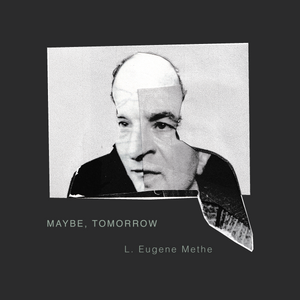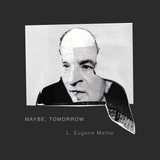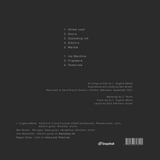L. Eugene Methe - Maybe, Tomorrow LP
Limited To 100 Copies
Grapefruit Records
GY13-5
L. EUGENE METHE (pronounced meth-e) is a sub-underground DIY lifer. At age 17, Methe started performing at bars in Omaha, Nebraska, fronting a band with six guitars, bass and drums that sounded like a disparate mix of the Spacemen 3 and Henry Mancini. Methe has since released dozens of recordings on numerous labels, moving in a variety of musical directions. He also owns and curates Gertrude Tapes, a label that since 2003 has released experimental vinyl and cassettes in small editions. Its eclectic roster includes artists Dan Melchior, Linda Smith and Nancy Andrews, Dennis Young (Liquid Liquid), Zach Rowden, Mary Staubitz and Russ Waterhouse, A.F. Jones, and others.
Maybe, Tomorrow, which is out June 23rd via Grapefruit Records, marks Methe’s first lyrical-based LP since 2011’s Calendar Work (Grapefruit). In the decade after Calendar Work, Methe focused on instrumental albums with Citizen Electrical (a string and electronics duo with Megan Siebe), Rake Kash, and experimental quartet Naturaliste, which recorded its 2021 Temporary Presence LP in a Shanghai, China, music shop in 2019. Methe also has contributed keyboards to records by Dennis Callaci, Simon Joyner, Refrigerator and Brian Crook of the Renderers.
Maybe, Tomorrow trades the lush, acoustic instrumentation of Calendar Work for all electric gear. Minor chords, discordant organ washes and detuned synthesizer stabs punctuate the songs. Violin arrangements are processed with vintage samplers. Low art occasionally seeps into the consciousness: the electric guitar tone was inspired (unironically) by Paul Reynolds from A Flock of Seagulls, but it ultimately came out sounding like a lawnmower run through a flanger pedal.
Methe loosely wrote Maybe, Tomorrow before fleshing it out in 2021 with recording and mix engineer Ben Brodin at Hand Branch Studio in Omaha. Many of the lyrics were inspired by personal events, as well as the age-old songwriter themes of mortality and religion. Lyrically, Methe takes a more naturalistic approach than usual:
- Opening track “Street Leaf” borders on a dirge but with the eulogy delivered in the first person by a narrator whose disconnect with reality leads to the stark realization that their existence was a “fiction of a fiction.”
- “Electric” is all youthful revisionist history, a person living “on the edges of a song that treats the echo like a drum.”
- “Exploding Ink” could be about purveyors of societal doom like novelists Emile Zola or Theodore Dreiser, singer-songwriters who extract lyrical content from their neighbor’s hardships, biblical prophets or all of the above
- “Hours” chronicles an evening of non-linear sorrow, time traveling with someone afflicted with dementia.
- The broken characters of “Ice Machine” enter a bar “with temptation in the right eye and blackout in the left” and find themselves frozen in the coils with fellow patrons. That churning track segues into the pulverizing industrial instrumental “Frigidaire.”
- One of the ugliest sounding songs Methe has ever put down to tape, “Frigidaire” casts a crude 9-minute shadow over side two.
Maybe, Tomorrow ends with a flicker of beauty and hope, neatly encapsulated in the album closer “Tomorrow.” The track features resurrected and revised lyrics from a 2010 7-inch, and features hypnotic vibraphone from engineer Ben Brodin.
Genre: Experimental, Rock
For Fans Of: Scott Walker’s album Scott 3, Cabaret Voltaire’s Red Mecca, Johnny Mercer, Hans Fallada




